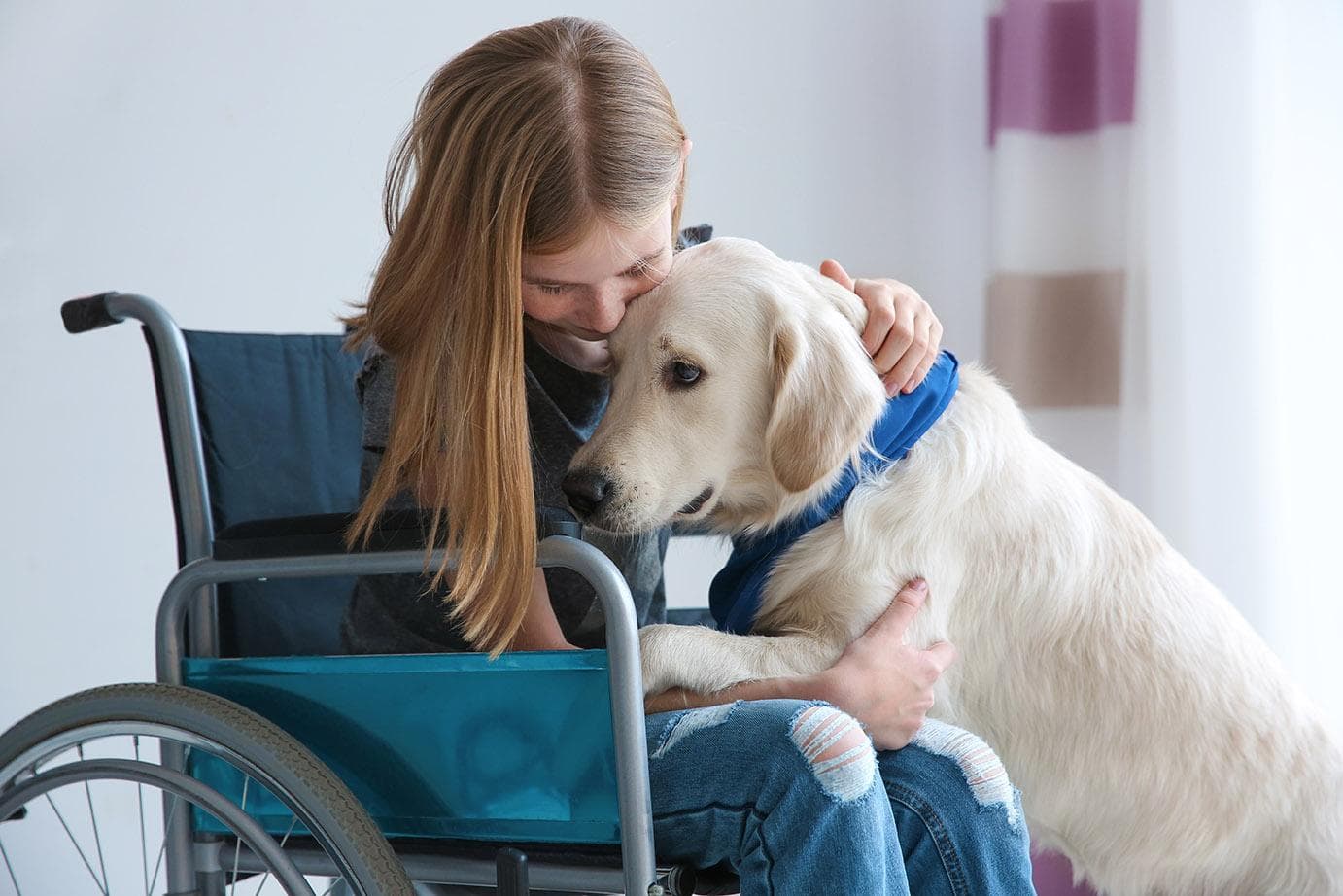Pet owners will agree that having an animal companion is a rewarding experience with sometimes unexpected yet welcomed health benefits. It’s not surprising, given that humans domesticated dogs between 20,000 to 40,000 years ago. We’ve been fast friends ever since. Archaeological evidence shows we even wanted them with us in the afterlife, based on remains found with human burials1.
Our close relationships with pets aren’t surprising when you consider we share 84% of our DNA with dogs and 90% with cats. Pet therapy goes back to the times of the ancient Romans. It was used in the 9th century in Belgium using livestock. Experts credit Englishman William Tuke for developing the modern practice of pet therapy. So, what are some of the main benefits of owning a pet?
The 12 Health Benefits of Pet Therapy
1. Stress Relief
Perhaps because canines have served as watchdogs and guardians, they make us feel safer by reducing stress and anxiety. That’s taken on a modern-day twist with students leaving home for the first time to go to college. Researchers have even confirmed that using animal-assisted interventions (AAIs) at universities helps students cope better during these stressful times.

2. Improved Mood
It’s hard not to smile if you watch a couple of puppies playing and chasing each other. However, it goes much deeper, particularly if a person engages in ownership therapy. According to research, the human-animal bond is uplifting on many levels. It occurs because being with a pet comforts us, even if we’re going through traumatic experiences in our lives.
3. Increased Activity
Unless you have a fenced yard, the chances are you’re taking your pup for a walk at least a few times a day. You’re probably also increasing the steps you take each day. The same thing applies to a therapy pet. Going outside with a dog can provide valuable mental stimulation for you and the animal. It can sharpen your fine motor skills, all from a boost in activity.

4. Better Cardiovascular Health
Improved cardiovascular health is one of the best benefits of pet therapy. Merely petting an animal can lower your blood pressure and reduce risk factors for heart disease. It’s an outcome of many of the other ways that pet therapy influences your health. The great thing about it is that the animal also benefits from the attention.
5. Decreased Loneliness
Whether a volunteer visits you with a therapy animal or you own one yourself through a service, there’s no denying the benefits of pet therapy for seniors. Even if they don’t admit it, owners talk to their animals. Some treat them as family members. Pet therapy can help older adults escape feelings of loneliness and isolation, especially if they’ve lost their spouses.

6. Improved Test Scores
Stress and anxiety are common feelings among college students with the pressures of tests and exams. It’s no wonder that these emotions may adversely affect their performance.
One study found that AAIs on campus could help students cope better with these feelings, with effects that lasted long after therapy sessions. The result was improved academic scores, further supporting the reduction of stress and negative emotions.
7. Better Rehabilitation Outcomes
Healthcare practitioners use pet therapy in various settings. One emerging area has been rehabilitation after trauma or treatments. Researchers have found that animal-assisted therapy (AAT) can improve the quality of life and social behavior in patients with brain injuries. They documented mood improvement and better communication when animals were a part of patient treatment.

8. Support for Dementia Patients
Pet therapy also has applications for patients with dementia or other forms of mental illness. Scientists have found that AAT not only improved symptoms of depression but also influenced cognitive function in seniors in long-term care facilities. These benefits, in turn, improved the quality of life of patients in these situations.
9. Aid for Children With Learning Disorders
Coping with learning disorders is challenging for children and adults. Treatment is often difficult with conditions like dyslexia linked to 42 genes. These disorders can have profound effects on these individuals. Research has shown that pet therapy may offer new ways to support these patients. One study found therapy dogs could encourage children to read and help them succeed in this vital skill.

10. Support for PTSD Patients
While still in its infancy, some research shows that pet therapy can improve outcomes in patients with post-traumatic stress disorder (PTSD). Scientists have found a significant reduction in symptoms in a relatively short time. That translated into less anxiety and an overall better quality of life for patients using this treatment option.
11. Pain Reduction
Pain undoubtedly has an emotional component, which can offer a treatment option that can positively affect patient recovery. A study by Loyola University Health System found that using pet therapy with individuals recovering from joint-replacement procedures halved the use of pain medication. Trained service dogs could help patients during recovery by doing common tasks for their owners.

12. Unconditional Love
One of the best things about being with a pet is the unconditional love you receive. There’s no judging or criticizing; it’s just boundless affection, no matter what your condition or injury. A therapy animal can improve your quality of life by lifting your self-esteem. Everyone wants to be loved. These pets will ensure it happens for anyone who needs it.
Conclusion
Early humans probably had no idea how domesticating animals would affect future generations. Our bonds with our pets have grown stronger through the centuries. We depend on each other for companionship with an undying love. It’s probably not a stretch to say that having a dog, cat, or whatever pet you have is a form of daily therapy.
Featured Image Credit: Monkey Business Images, Shutterstock
Contents
- The 12 Health Benefits of Pet Therapy
- 1. Stress Relief
- 2. Improved Mood
- 3. Increased Activity
- 4. Better Cardiovascular Health
- 5. Decreased Loneliness
- 6. Improved Test Scores
- 7. Better Rehabilitation Outcomes
- 8. Support for Dementia Patients
- 9. Aid for Children With Learning Disorders
- 10. Support for PTSD Patients
- 11. Pain Reduction
- 12. Unconditional Love
- Conclusion











